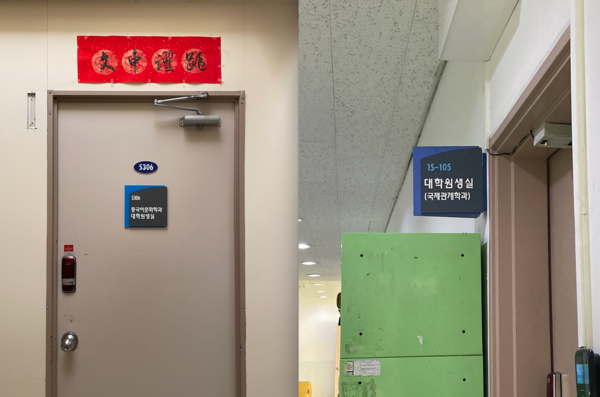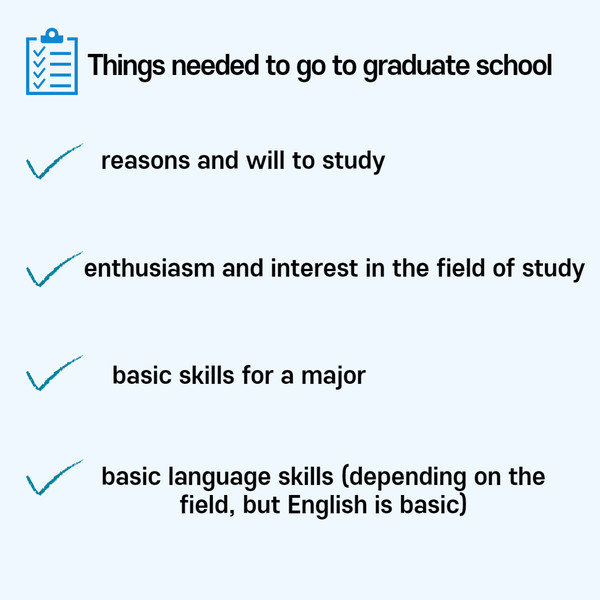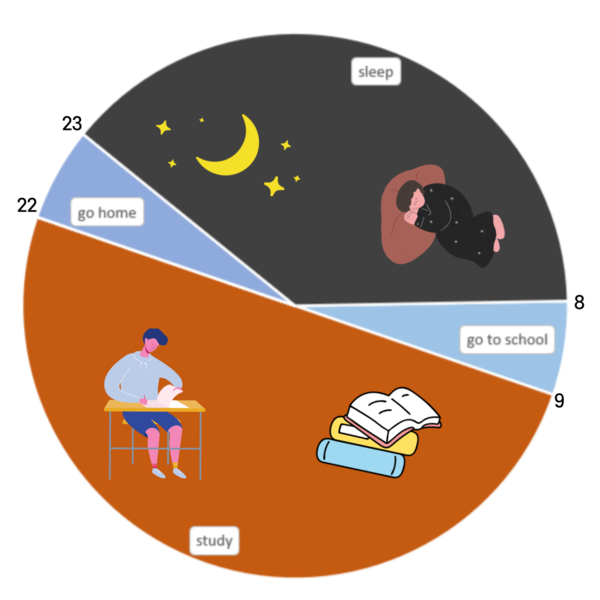According to statistics from the Korea Research Institute for Vocational Education & Training, among those who acquired a master's degree or doctorate, only 71.8 percent of doctors were employed as of 2020, and 52.4 percent of masters were employed as of 2018. Last year in Korea, education authorities also showed that 99,185 people graduated from graduate school and earned master's or doctorate degrees, reaching 670,000 over the past decade. As the job market freezes due to COVID-19, it is becoming difficult for those with expertise in the field to get jobs and show their ability. Moreover, the annual tuition at private graduate schools in Seoul is over 10 million KRW. It is a major contradiction that the same level of tuition has been maintained following the onset of the COVID-19 pandemic. As the basic part of graduate school is still lacking, more detailed measures are needed. However, even in this situation, there are people who continue their research by going to graduate school with an enthusiasm for learning. The UOS Times interviewed Kim Myung-jun (Dept. of Chinese Language and Culture) and Lee Su-jin (Dept. of Urban Planning and Design), who attend graduate school at University of Seoul (UOS).

1. What led you to go to graduate school?
Kim: I took my first class after entering university, and it was so much fun. I thought I should go to graduate school from then on. I just wanted to learn more because I liked studying China. Anyway, I’m not interested in getting a job because I have a field I want to do. I have never thought about getting a job. Of course, it is not that I didn't have any concerns about my career, but I have been consistently hoping to be a graduate student since I was a freshman.
Lee: I found a system that allows me to finish my master's degree a little faster. Also, my assistant and professor told me to apply, saying it was a good opportunity, so I went to graduate school after much consideration.
2. Things needed to go to graduate school

Kim: There is a proverb I'm engraving in my heart: "Studying people should not worry about their talents falling short but about their lack of meaning." Of course, before entering graduate school, you will need language skills or basic skills for your major, but the most important thing is the reason and will to study in graduate school. Why I want to study this and what I want to study are the most important things before going to graduate school. Without this, graduate life would be boring.
3. What was your biggest concern when you went to graduate school? Have you resolved your worries since entering school?
Kim: The biggest concern was about my career. The science department has great advantages in employment and annual salary after obtaining a degree. However, for a humanities student, the choice of graduate school is really "because I like studying." Thus, I was worried that I might be wasting my time when I go to graduate school. Most of all, I was not sure I could do well. However, after consulting with the professor, the problem was solved. I am very satisfied with my graduate life now.
Lee: I did not have major concerns, but I wanted to quit while I was in graduate school. I was very tired because my school and home were far away and I wanted to go to a better graduate school. Fortunately, I did not quit because of the professor's encouragement, and the problem was solved.
4. What kind of research are you currently working on?
Kim: I am working on the social management policy of the Chinese government. Specifically, I am studying a social credit system related to data technology. Through this system, I would like to explore the future direction of the Chinese government.
Lee: I study the driving environment of personal mobility, such as electric kickboards. Also, I study how the actual road environment affects the driving of personal mobility devices, and what infrastructure should be provided to make the city safer.
5. What is the difference between undergraduate and graduate students?
Kim: Being a graduate student means taking the first step toward becoming a professional researcher. Undergraduate students end up faithfully fulfilling their professors' assignments, but graduate students should find and study their own areas of interest. The difference is that you have to do "Self-directed Learning." If undergraduates were consumers of knowledge, graduate students should now be producers of knowledge.
Lee: There is a certain difference in depth. I can continue to study the fields I am interested in, and there is a depth that comes from such persistence. You can study the areas you have wanted to or have been interested in since you were an undergraduate more deeply.
6. Is your daily schedule challenging?

Kim: I am like an office worker. I go to school at 9 a.m. and study until 8 p.m. I attend a lecture about twice a week. On days without classes, I play just like undergraduates. Sometimes I have a lot of work to do, but the daily schedule itself is reasonable. Graduate students can adjust their daily schedules at their disposal. In the liberal arts department, there are often no separate laboratories like in the natural sciences department. Therefore, if you want to rest, you can spend your free time lying at home. However, entering graduate school requires constant self-development time because it is to develop knowledge. Studying or reading books during leisure time should also be regarded as an extension of work.
Lee: I woke up at 9 a.m. 9 a.m. is a little late, but if you wash up quickly, you will arrive around 10 a.m. After I finish some work with my paper, I eat lunch. After lunch, I have some free time to do simple exercises with music to overcome my food coma. I keep working on my paper all day, and when I am done with the day's work, I take time to study what I am not good enough at. It is the same routine every day, but it feels like time flies. Natural sciences department is free to go to work as well. If you have a problem with your condition, you can adjust it on your own right away. Most graduates do not overdo it to the point of having health problems.
7. The perception of graduate students is not good; what do you think about it?
Kim: People do not believe me when I say this all the time, but I am happiest now. It is good to have a discussion with a friend about learning. Also, there is the happiness of having a little beer after the day is through. When I read a book that I did not understand when I was an undergraduate, it is really rewarding when I understand it. I feel that I am growing intellectually. I have not written a proper academic paper except for small papers because I am still working on my master's degree. Later, when one good research result comes out, I think it will be my happiest moment.
Lee: I am really satisfied with my current job. If I had not come here, I would have been lazy. Originally, I did not think much about getting a job, but the current activity is giving me a sense of purpose now. I was very grateful to be studying with the people in the lab, and I was able to see myself interested in this field that I thought would be boring.
The interview shows that the thoughts of undergraduates regarding graduate students are quite far from their actual life. In fact, the negative perceptions that have occurred in the past are improving. In the case of graduate students in the natural sciences department, they frequently handle chemicals. Nevertheless, there was no opportunity to receive sufficient compensation in the event of an accident due to the lack of worker status. However, with the shared perception of such accidents, the National Assembly created a law to allow students who study to access industrial accident insurance. The law also includes graduate students in the liberal arts. Graduate students are voicing these issues through the labor union voluntarily, breaking away from their previous passive attitudes. The interviewees also told the reporters that they had many worries before entering graduate school, but many of those worries had been resolved since entering their graduate program. Rather than such concerns, The UOS Times could see that there was an environment in which graduate students could focus more on research for and the development of their own dream.
Employment is indeed an important problem for all students, and the job market is much narrower for graduate students. It is true that having a graduate degree is more advantageous for getting a job than a bachelor's degree, but there are not many jobs that can be more beneficial than the resources invested in graduate schools. However, graduate students continue to seek out graduate education because their purpose is not simply to get a job. They have long been interested in learning and have a pure passion for it. In fact, companies value this experience and send overseas training after the employees are hired to obtain master's and doctorate degrees. This experience is often the basis for faster promotions and higher starting salaries. In terms of their workload, the amount of knowledge they gain is also enormous, vastly greater than that of undergraduates. To summarize, the view of graduate students as unemployed is overly narrow. The UOS Times hopes that future graduate students will think differently when they see this article.

